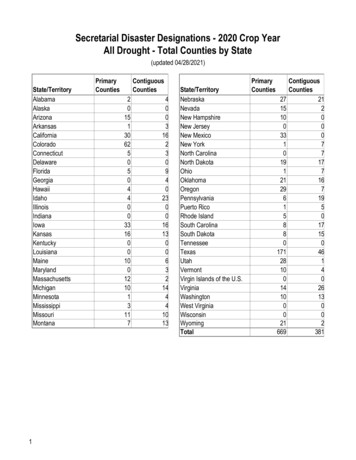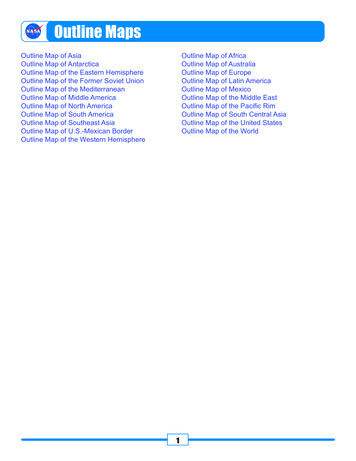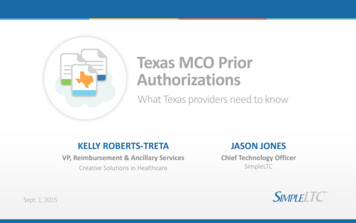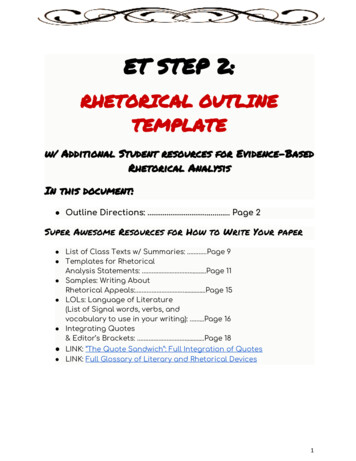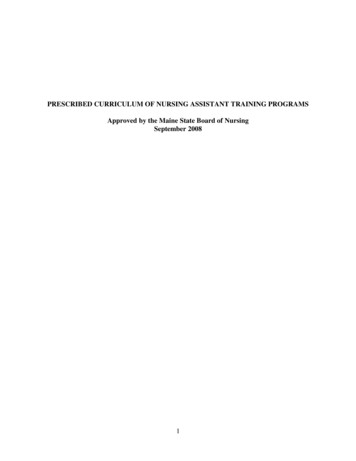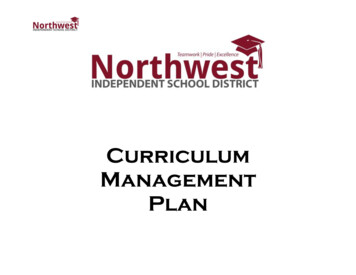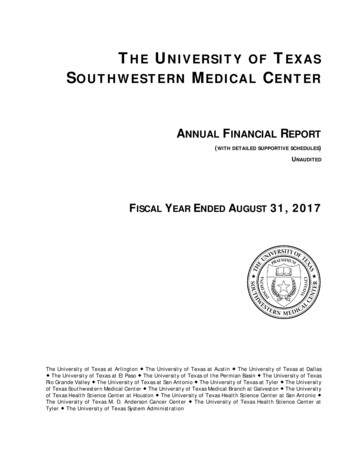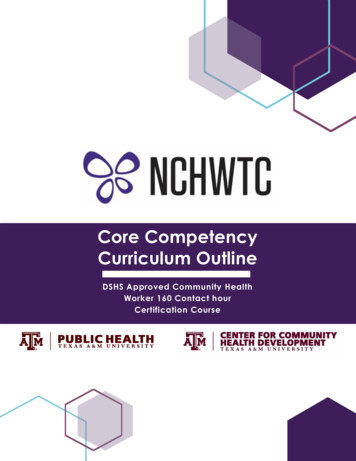
Transcription
Core CompetencyCurriculum OutlineDSHS Approved Community HealthWorker 160 Contact hourCertification Course
CHW Curriculum Outline Community Health Worker (CHW) CourseNational Community Health Worker Training CenterCenterCenterAbout the CenterThe CCHD’s National CHW Training Center (NCHWTC) is a TexasDepartment of State Health Services (DSHS) certified CommunityHealth Worker (CHW) Training Center. The Training Center is housedwithin the Center for Community Health Development (CCHD), partof the Texas A&M University Health Science Center School of PublicHealth.Our Mission: Stregthening capacity and building healthiercommunities through training well-equipped CHWs and Promotores.CHW Certification CourseThe CHW certification courses are utilized for interactive learning. Ourcertified CHW Instructor, Paula Saldaña, teaches this course. Thiscourse consists of weekly presentations, homework, and shadowingthat can be flexible to your schedule.Please see the attached calendar for the upcomingcohort/semester.DSHS CertifiedOur training center has been DSHS certified since 2010, and has sincethen trained over 7,000 CHWs.Moreover, our CHW certication course is also DSHS certified. It consistsof160 hours of instruction and training with at least 20 clock hours ineach of the following eight core competencies: communication skills,interpersonal skills, service coordination skills, capacity-building skills,advocacy skills, teaching skills, organizational skills, knowledge baseon specific health issues. Moreover, see the curriculum outline tolearn more about the topics introduced to trainees.While out-of-state trainees may take this course, Texas trainees whocomplete our training may additionally apply with DSHS at no chargeto be a certified . Note, DSHSapplicants must be Texas residents and at least 16 y/o.Trainee’s Testimonials “The course along withthe certification gavean added boost inconfidence to apply fora CHW position.” – Fall2017 CHW Trainee“I especially loved thatthe classes wererecorded just in casewe needed to go backand listen to the lessonagain for any reason.” –Fall 2017 CHW Trainee“Instructor was veryengaging andencouraging. I enjoyedher.” – Spring 2018 CHWTrainee“I think every methodused to present thiscourse was well done! Itwas easy to understandand easy to follow. Ifeel students withaccess to just internetwill benefit greatly in alllevels!” – Spring 2018CHW TraineeThis curriculum is developed and 2019 by the Texas A&M School of Public Health, Center for Community Health Development,National Community Health Worker Training Center, DSHS Approved.1
CHW Curriculum Outline 3.24.25.26.Total Hours by ActivityInformation & Outline of CourseIntroduction ActivityCourse OverviewDefinitionsa. CHWsb. Promotoresc. Patient NavigatorsMain characteristics & qualitiesCore competenciesa. Communicationb. Interpersonal skillsc. Service Coordinationd. Capacity Buildinge. Advocacyf. Teachingg. Organizational Skillsh. Knowledge BaseJob descriptionsWorkforce developmentLiterature FindingsModels of careReasons employers utilize CHWs/patientnavigatorsBarriers/ challenges to CHW/PN programsNational movement, certification, and strategiesa. Practicum Student’s VideoBest PracticesHistory of CHWs in TexasDSHS CHW/Promotora Program: certificationrequirements & processPatient navigation history & new developmentsCommunication goalsParts of communicationCommunication skills & strategiesPoor communication skillsCommunication barriersa. Language differencesb. Cultural differencesc. Beliefsd. Valuese. Age & life experiencesf. Sensory impairmentsg. Cognitive impairmentsTypes of communicationa. Verbalb. Non-verbalIneffective communicationa. Ineffective communication behaviorsb. Negative non-verbal communicationc. Roadblocks to effective communicationEffective communicationa. Effective communication strategiesActive listeninga. Listening versus hearing2 Class instruction: 7.5hrsHomework: 5 hrsHands on: 7.5 hrsTotal:20 hours
CHW Curriculum Outline b. 4 types of listeningc. Effective feedback after active listeningd. Causes of poor listening27. Listening tips28. Facilitative questioninga. “I” Statementsb. Types of questionsc. Effective questioningd. Ineffective questioning29. Motivational interviewinga. Definitionb. General principlesc. Methods30. Health literacya. Definitionsb. National statisticsc. Basic health literacyd. Teaching health literacy31. Conducting effective conversations32. Public speakinga. The speech communication processb. Knowing your audiencec. Demographic audience analysisd. Situational audience analysise. Adapting to the audiencef. Organizing a speechg. Use of appropriate languageh. Meanings of wordsi. Speech deliveryj. Vocalizationk. Visual aids33. Electronic communication & social media34. Communicating with healthcare providers/professionalsNote: Bolded text correspond to topics that are listed under DSHS Community Health Worker CoreCompetencies.3
CHW Curriculum Outline CompetencyTopicsTotal Hours by activityProfessional conduct Class Instruction: 7.5Ethical decision makinghrsPatient confidentiality Homework: 5 hrsHIPAA Hands on: 7.5 hrsa. Patient’s rights guaranteed by HIPAATotal : 20 hoursb. Patient’s Privacy5. Protected Health Informationa. Location of PHIb. When we can share PHIc. Permission to use PHId. Computerse. Disposal of informationf. E-mail & faxesg. “Need to know” rule6. Patient safety7. Personal vision & reflection8. Self-esteem9. Personal boundaries & limitationsa. Knowing your limitsb. Maslow’s Hierarchy of needs10. Personal Safety11. Hazardsa. Physical hazardsb. Biological hazardsc. Mental hazards12. Stressa. Common negative stressorsb. Symptoms of negative stressc. Negative ways of coping with stressd. Common positive stressorse. Symptoms of positive stressf. Positive ways of coping with stressg. Help for stressful situations13. Cultural Competencya. Cultural humilityb. Cultural sensitivityc. Linguistic Competence14. Linguistic competence15. Interpersonal skills16. Definition of interpersonal skills17. Improving interpersonal skills18. Keys to effective relationships19. Building trust: a culture of confidentiality20. Principles of motivation21. Goal setting22. Problem solving23. Coping skills24. Psychosocial supportNote: Bolded text correspond to topics that are listed under DSHS Community Health Worker CoreCompetencies.Interpersonal Skills1.2.3.4.4
CHW Curriculum Outline CompetencyTopicsTotal Hours by activityDefinition of service coordination Class Instruction: 7.5Who does service coordinationhrs“Hats” of a service coordinator Homework: 5 hrsCharacteristics of service coordinators Hands on: 7.5 hrsIdentifying needsTotal : 20 hoursAssessing a client’s needsa. Assessing client’s readiness to changeb. Assessing clients strengths & barriersc. Paperworkd. Assessment formse. Resource access plansf. Household budgetingg. Referralsh. Transportationi. Patient follow-up7. Teaching clients about the health caresystem8. Patient & caregiver support9. Finding community resourcesa. Identification of resources & partnersb. Developing & consolidating resourcesc. Resource directoriesd. Gathering community resourcese. Networkingf. Coordinate resources10. Accessing information11. Electronic database programs12. Insurance 101a. Eligibility & enrollmentb. Providers & servicesc. Costs & paymentsd. Sources of health planse. Types of health plansf. Managed careg. MedicaidNote: Bolded text correspond to topics that are listed under DSHS Community Health Worker CoreCompetencies.ServiceCoordination Skills1.2.3.4.5.6.5
CHW Curriculum Outline CompetencyTopicsTotal Hours by activityCapacity building definitions Class Instruction: 7.5Types of community changehrsTheory of change Homework: 5 hrsPerception Shift Hands on: 7.5 hrsCapacity building functionsTotal : 20 hoursCapacity building challengesChange progressionRole of agencies/organizationsCommunity activityCommunity actionCommunity capacity building/communitydevelopment12. Community development13. Coalitionsa. Formationb. Who’s involved?c. Planning logisticsd. Inviting participantse. Meeting preparationf. Meeting facilitationg. Follow-up14. Leadershipa. 8 tips for becoming a true leaderb. Dressing Appropriatelyc. Techniques for teaching problem solving15. Conflict resolutiona. Definition of conflictb. Types of conflictc. Positive & negative effects of conflictd. Understanding different conflict stylee. Essential steps to conflict resolutionf. Conflict mappingg. Tips for conflict resolutionh. Interacting with othersi. Role of CHW16. Resource development & fundingstrategiesa. Identifying resources & partnersb. Identifying current needc. Develop & consolidate resourcesd. Internet campaignse. Corporate sponsorshipsf. Charitable foundationsg. Local vendor salesh. Radio-thonsi. Public service announcementsj. Next stepsNote: Bolded text correspond to topics that are listed under DSHS Community Health Worker CoreCompetencies.Capacity BuildingSkills1.2.3.4.5.6.7.8.9.10.11.6
CHW Curriculum Outline CompetencyTopicsTotal Hours by activityAdvocacy definitions Class Instruction: 7.5Approaches to advocacyhrsWhy advocate? Homework: 5 hrsBarriers & challenges Hands on: 7.5 hrsWhat’s involved in advocacy?Total : 20 hoursAdvocacy activitiesPaths of advocacy messagesAdvocacy levelsAdvocacy rolesHow to advocateAdvocacy checklistTypes of advocacya. Legislative advocacyb. Judicial/ legal advocacyc. Administrative advocacyd. Budget advocacye. Media advocacyf. Changing public opinion13. Advocacy in Texasa. Texas Government basicsb. Difference between advocacy & lobbyingc. Calls to action14. CHWs & Advocacya. Why should CHW care?b. Effective advocacy as CHWsc. Preparation & researchd. Facts and informatione. Building relationshipsf. Presenting effectivelyNote: Bolded text correspond to topics that are listed under DSHS Community Health Worker CoreCompetencies.Advocacy Skills1.2.3.4.5.6.7.8.9.10.11.12.7
CHW Curriculum Outline CompetencyTopicsTotal Hours by activityDefinition of teaching Class Instruction: 7.5Qualities of a good teacherhrsDefinition of learning Homework: 5 hrsTeaching methods Hands on: 7.5 hrsTeaching strategiesTotal : 20 hoursa. Lesson Plan6. Teaching skills7. Preparing good presentations8. Learning domains9. Adult learning – critical elements10. Type of learners11. Learning styles12. Health information13. Health educationa. Physical aspects of illness & diseaseb. Healthy & unhealthy behaviors14. Health promotion & outreachNote: Bolded text correspond to topics that are listed under DSHS Community Health Worker CoreCompetencies.Teaching Skills1.2.3.4.5.8
CHW Curriculum Outline CompetencyTopicsTotal Hours by activityDefinition of organization/organized Class Instruction: 7.5Why is organization important?hrsBenefits to organization Homework: 5 hrsComponents of being organized Hands on: 7.5 hrsOrganization tool boxTotal : 20 hoursOrganization strategiesOrganization tipsOrganization barriersMulti – tasking vs. mono – taskingTime managementa. Saying nob. Keys to respecting your timec. Reducing interruptionsd. Time wasters11. Organizational skillsa. Setting goalsb. Making plansc. Guidelines for priority settingd. To-do Listse. Steps to organize each day12. Data collection methodsNote: Bolded text correspond to topics that are listed under DSHS Community Health Worker CoreCompetencies.Organization Skills1.2.3.4.5.6.7.8.9.10.9
CHW Curriculum Outline CompetencyTopicsTotal Hours by activity1. Healthy Web Surfing Class Instruction: 7.5a. Consider the sourcehrsb. Focus on quality Homework: 5 hrsc. Evidence Hands on: 7.5 hrsd. CurrencyTotal : 20 hourse. Biasf. Website ownershipg. Protecting your privacyh. MedlinePlus2. Behavior changea. Determinants of Health3. Physical aspects of illness & diseasea. Tips on when to refer client to a doctor4. Healthy behaviorsa. Nutritionb. Physical activityc. Tobacco Cessation5. Technologya. Computer programsb. Cell phones/ texting/ mobile appsc. Social mediaNote: Bolded text correspond to topics that are listed under DSHS Community Health Worker CoreCompetencies.Knowledge-basedSkills10
18. Communication goals 19. Parts of communication 20. Communication skills & strategies 21. Poor communication skills 22. Communication barriers a. Language differences b. Cultural differences c. Beliefs d. Values e. Age & life experiences f. Sensory impairments g. Cognitive impairments 23. Types of communication a. Verbal b. Non-verbal 24.
